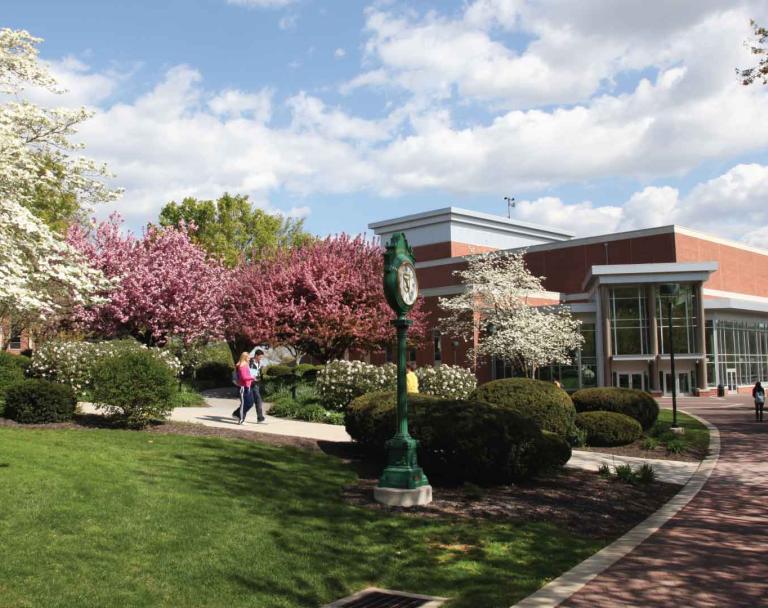Campus Recreation Helps York College Students Keep Active During COVID-19

Campus Recreation helps York College students keep active during COVID-19
April 13, 2021 Rachel Finley (left) and Cody Seachrist (right)Rachael Finley, Director of Campus Recreation, frequently sees students coming to blow off steam on the treadmill or take a break from studying on the rowing machine. She watches students make connections and deepen their friendships playing intramural sports. Often, she notes how much lighter a student seems after a workout or a chance to just talk to someone in the Grumbacher Sport and Fitness Center.
A New Approach to Activitiy
When COVID-19 impacted campus activities, including programmed recreation, Finley worried about the students who needed those opportunities to take a break and get into healthy routines. “We know that exercise is healthy, but Campus Recreation goes beyond the benefits of a workout,” she says. “It’s a place for students to find community.”
A lot of students who are drawn to Campus Recreation are those who don’t often fit into the traditional definition of an athlete, Finley says. While a lot of people consider an athlete to be someone who plays varsity sports, she sees an athlete in each of the students who sign up for a club sport or step onto the racquetball court.
She also finds that students develop leadership skills, learn to think strategically, and become more involved members of the York College community when they participate in recreational sports.
“I identified as an athlete through club volleyball, so I know what it’s like for people to discount that,” she says. “If I wouldn’t have had the opportunity to play sports through recreational programs, I know my life would be drastically different.”
Keeping students safe
The Campus Recreation team had some unique challenges when COVID-19 forced many changes. About 35 pieces of cardio equipment were moved out of the fitness center and organized on the lower level where they could be spread out. The core training area for ab workouts was moved to the racquetball court, where students could claim a 10-foot square section of the floor to do their exercises.
“We were fortunate that York College has the space to still offer a lot of recreational opportunities,” Finley says. “A lot of schools had to give up on those programs because they didn’t have the facility space to spread out. We didn’t have to take that away from our students.”
Assistant Director of Campus Recreation Cody Seachrist was very proud of how hard the staff worked to adhere to the new guidelines and safety protocols. “Our intramural supervisors and officials work diligently on the cleaning and sanitization process that has been introduced and increased due to COVID-19. We all want to make our programs feel safe and be fun while adhering to campus guidelines and safety precautions,” he said.
Club sports and intramurals have continued through the spring semester while following all social distancing and mask-wearing policies at all times. Seachrist said that, especially for club sports, the leaders have learned and educated their teams on the best practices to keep their teammates safe and healthy. While it has been a “limited, but organized practice environment, they have worked hard to make sure they are following campus guidelines, checking temperatures of our club sport athletes, and taking time to do properly distanced drills and activities using cones and markers to ensure social distancing,” he said.
A New Offering
One of the biggest highlights of the 2020 fall semester was the Knocker Soccer tournaments, where students wore inflatable “balls” that covered them from head to torso. It was the creative thinking of the Campus Recreation team that helped them adapt to those types of programs for keeping students engaged and safe.
“We heard from a lot of students that they felt comfortable coming to our facilities because they knew how cautious we were being,” Finley says. “That was really important to us. We wanted students to feel they could still find a place to continue or develop their healthy habits.”
Categories
